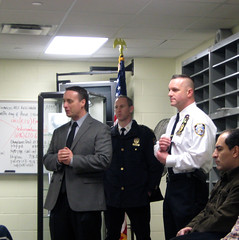Captain John Cappelmann has taken over his new post as the top police officer in the East Village with a bang, arresting three men suspected of a string of nine middle-of-the-night robberies of local businesses as well as a series of apartment break-ins.
In a conversation with The Local that covered his previous experience policing public housing in Northern Manhattan, gang activity in the East Village and the challenges of quality of life enforcement, the new commanding officer of the Ninth Precinct shared a few more details about the bust.
“Burglaries are the biggest crime that we have here, grand larcenies notwithstanding,” Captain Cappelmann said in his office overlooking East Fifth Street. “We normally average about 16 for a 28-day period. So, that would be four a week on average from last year. Now to go almost three days since the arrest without any burglaries, I think we got the right people.”
When Captain Cappelmann, 43, first took over on Jan. 30, there were five active burglary patterns in the neighborhood, one of which involved thieves breaking into shuttered businesses late at night.
On Feb. 13 at around 2:15 a.m. two officers caught a pair breaking into Il Bagatto on East Second Street, the ninth similar type of burglary in the East Village. Questioning yielded a third man who was on the precinct’s list as a prime suspect — proof, Captain Cappelmann said, of the importance of targeted enforcement. “We’re looking at specific people who are committing the crimes. Looking at recidivists, looking at the parolees, looking at the probationers, because you’ll see time and time again the same people are committing the crimes,” he said. The group — which is still being investigated, hence the thin details — is suspected in three of the five burglary patterns in the neighborhood.
At the Ninth Precinct Community Council meeting on Tuesday, Captain Cappelmann pointed to the arrests as an example of the type of police-work that gives him particular pride. He was quick to give credit to his predecessor, Deputy Inspector Kenneth Lehr, who presided over an 11 percent decrease in crime over his two-year tenure. Mr. Lehr also implemented the plan that netted the burglary suspects, and gave advice regarding the nature of policing the East Village.
 Stephen Rex Brown Deputy Inspector Kenneth Lehr addressed the community council — likely for the last time — on Tuesday.
Stephen Rex Brown Deputy Inspector Kenneth Lehr addressed the community council — likely for the last time — on Tuesday.“He said, ‘This is a 2200 to 0600 command,” Captain Cappelmann said of Deputy Inspector Lehr, meaning that most of the action takes place from 10 p.m. to 6 a.m. The East Village will certainly present a new set of challenges for the new commanding officer, who previously policed public housing in Harlem, the Upper West Side, and Morningside Heights.
“Where I was used to dealing with shootings and robberies on a daily basis, now we’re concerned with quality of life issues; noise complaints from bars and disorderly groups,” he told The Local.
Because of that, Captain Cappelmann — who is from Flushing, Queens and has worked for the police department for 16 years — pledged to commit his officers to following up on 311 complaints. “I think we can probably do better answering 311 complaints that we get,” he said, noting that 85 percent of the 303 complaints that came in during the previous 28-day period were noise-related complaints. Of those complaints, roughly 60 percent were related to drinking establishments — hard data that reinforces the issues with nightlife that dominate nearly every local civic meeting.
“When people take the time — they give their name and stuff like that — we need to follow up on that and speak to that person and see what their complaint is. Maybe get [the Department of Environmental Protection] to go to their apartment,” Captain Cappelmann said.
While the new commanding officer might not be as acquainted with the challenges of the quality of life complaints in the neighborhood, his experience in northern Manhattan should serve him well when policing the public housing in the eastern part of the Ninth Precinct.
Incidents late last year, like the death of 17-year-old Donovan Salgado and the shooting of a 19-year-old man have raised concerns about the Money Boys gang around Campos Plaza.
“The majority of people identified as Money Boys don’t live in Campos, they live in the vicinity of Campos,” Captain Cappelmann said. “Some do live in housing, but they have issues with a group called ‘Stacks’ from Baruch Houses down in the Seventh [Precinct].”
Like other crime in the neighborhood, Captain Cappelmann noted that collaboration and communication with the officers walking the beat, detectives, the gang squad and the Seventh Precinct and Public Service Area 4 would yield more arrests like the one that took a loaded gun out of the hands of two alleged Money Boys.
Now, the new commanding officer is working 12- to 15-hour shifts, getting acquainted with the neighborhood. While visiting the memorial honoring the deaths of officers Gregory Foster and Rocco Laurie, who were shot on Avenue B, Captain Cappelmann was struck by the connection the community and police officers felt with the incident 40 years ago.
“When you see that a 23-year-old person cares about what happened 40 years ago to 22- and 23-year-old police officers like Laurie and Foster were, that means something,” he said. “It means people care. They’re going to work harder. They’re going to care about the community more. And they’re going to do their job in a more effective and efficient manner.”




